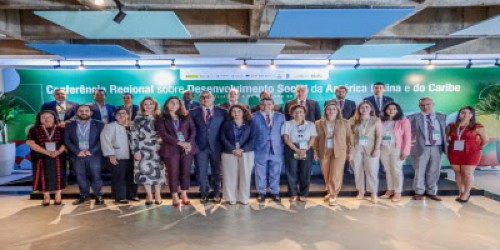 Representatives from Barbados, Haiti, St. Vincent and the Grenadines and Trinidad and Tobago have joined their counterparts from Bolivia, Brazil, Chile, Colombia, Costa Rica, the Dominican Republic, Ecuador, Guatemala, Honduras, Mexico, Paraguay, Peru and Uruguay at the meeting which ends on Thursday.
Representatives from Barbados, Haiti, St. Vincent and the Grenadines and Trinidad and Tobago have joined their counterparts from Bolivia, Brazil, Chile, Colombia, Costa Rica, the Dominican Republic, Ecuador, Guatemala, Honduras, Mexico, Paraguay, Peru and Uruguay at the meeting which ends on Thursday.
They have so far reaffirmed their resolve to keep working to achieve true inclusive social development and to take advantage of the region’s rich history of social innovation to forge a joint position on this issue in multilateral forums, which includes the proposal to adopt a global pact for inclusive social development in Qatar in November.
The intergovernmental gathering is organised by the Economic Commission for Latin America and the Caribbean (ECLAC), the government of Brazil and the United Nations Development Programme (UNDP), which is holding its 16th Ministerial Forum for Development in Latin America and the Caribbean simultaneously.
ECLAC’s Executive Secretary, José Manuel Salazar-Xirinachs, celebrated the Regional Conference’s 10 years in existence and its consolidation as a space where multiple stakeholders debate the challenges related to poverty, inequality and structural gaps that are faced by the region.
He said in the Latin American and Caribbean context, characterised by three traps that hinder its development, that the region continues to be the most unequal in the world.
“As is widely accepted and supported by evidence today, inequality hinders economic and job growth, and it is corrosive to social cohesion and the credibility of institutions,” he said.
“A global pact for inclusive social development must be closely articulated with the Sustainable Development Goals (SDGs) and the pillars addressed at the Summit of the Future, promoting a transformative and comprehensive vision. The details of this proposal arising in Latin America and the Caribbean are explained in the position document Latin America and the Caribbean 30 Years on from the World Summit for Social Development; Towards a Global Pact for Inclusive Social Development, which is being presented at this Sixth Session of the Regional Conference on Social Development,” the ECLAC official added.
Chief Economist for Latin America and the Caribbean of the United Nations Development Programme (UNDP), Almudena Fernández, indicated that “Latin America and the Caribbean is facing an unprecedented polycrisis, where social, economic and climate challenges are intermeshed and mutually amplify each other.
“In this context, social protection is not an expenditure – it is our best investment in stability, cohesion and the future. No country can face these challenges on its own: now more than ever, we need collective leadership and regional cooperation.
“From Brasilia we send a clear message to the world: this region has the knowledge, the experience and the political will to transform the uncertainty into a resilient, inclusive and sustainable development agenda,” Fernández added.
In a statement, Li Junhua, Under-Secretary-General for Economic and Social Affairs of the United Nations, agreed that “Latin America and the Caribbean, a region with a very rich history of social innovation, has a pivotal role to play
“Your leadership and experience are essential in aligning policy priorities with deliberations and outcomes of the Second World Summit for Social Development in Doha in November. I strongly encourage your governments to participate at the highest levels in the forthcoming Summit,” she said in a video message.
